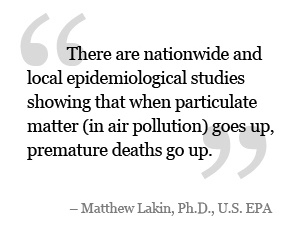Wood Smoke Pollution Kills More than Two Million People a Year
Here in the US, most of us don’t get exposed to extremely high levels of wood smoke inside our homes. But just like studying the lungs of two-pack-a-day smokers tells us about the harms of cigarette smoking, studying the effects of exposure to high levels of wood smoke tells us about the many ways that wood smoke can harm our health.
And what it tells us is not good.
When families in developing countries burn wood and dung in their homes for cooking and warmth, the fires produce levels of pollution that lead to the premature deaths of about 2 million people each year, more than either malaria or tuberculosis.
This disturbing news is discussed in a 2012 interview with Dr. Kirk R. Smith, a member of the National Academy of Sciences and Professor of Global Environmental Health at the University of California at Berkeley. Dr. Smith has spent decades studying the health effects of indoor air pollution due to biomass burning on women and children in developing countries.
Dr. Smith notes that there are parallels between the dangers of cigarette smoke and wood smoke. “Most people recognize that the worst thing you can do is stick burning stuff in your mouth. The second worst thing is to have burning stuff inside your house…”
According to Smith, “A fire in the kitchen, if you’re cooking a meal, produces about the same pollution per hour in a typical house as a thousand cigarettes burning. So, if you think about a thousand cigarettes burning inside your kitchen, it’s not surprising that there are significant health effects. The big difference is that children and babies don’t smoke, but they are in kitchens and are also being exposed to the household pollution, so there’s a large impact on children.”
Smith’s research focuses on interventions in developing countries to reduce the harm from wood smoke. Unfortunately, despite many programs that have introduced supposedly improved stoves, these programs have not been effective.
Smith explains, “…those stoves don’t get rid of the smoke, they just move it around. What you have to do now, I believe, is eliminate it; don’t produce the stuff in the first place.”
For more information about the effect of wood smoke in developing countries, see When Smoke Gets in Your Lungs.




